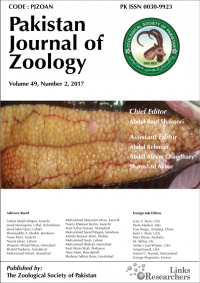Reproductive Biology of Triplophysa (Hedinichthys) Yarkandensis (Day) in the Tarim River, China
Reproductive Biology of Triplophysa (Hedinichthys) Yarkandensis (Day) in the Tarim River, China
Xinyue Wang1, Na Yao1, Chengxin Wang1, Shengao Chen1,2*, Yong Song1, Fangze Zi1, Jianmin Ge1 and Congxin Xie2
ABSTRACT
Triplophysa (Hedinichthys) yarkandensis (Day) is one of the most common fish in the Tarim River and is commercially important for the local fishing industry. In this study, we investigated the reproductive biology of T. yarkandensis. Totally, 940 individuals were sampled during January 2018 to December 2020.T. yarkandensis specimens (n = 940) were collected. The female to male ratio was 1:1.18. The standard length, weight and age of the females at minimum maturity were 82 mm, 7.4 g and 3 years old, respectively, and those of the males were 65 mm, 3.4 g and 2 years old, respectively. From June to August, the egg diameters exhibited a unimodal distribution, indicating that the eggs followed a pattern of one-time spawning. The fecundity of 88 females in stages IV-V was calculated; these calculations included the standard length (30 to 195 mm), weight (3.59 to 114.04 g), absolute fecundity (1101 to 56320; 9944 ± 5487), relative fecundity (824 to 1140; 982 ± 158) and population fecundity (4,034,600). The TW and TL of T. yarkandensis were positively correlated with absolute fecundity, meaning that its absolute fecundity increased with increasing TW and TL. This study provides much information about the reproductive biology of T. yarkandensis, which can be used for fish population protection and artificial reproduction research.
To share on other social networks, click on any share button. What are these?










